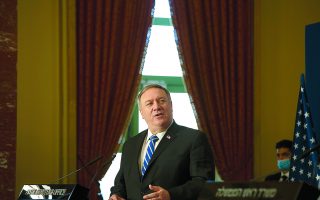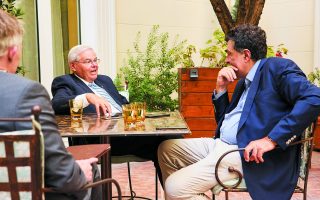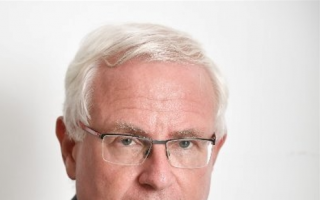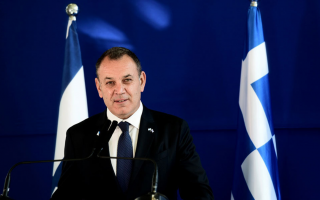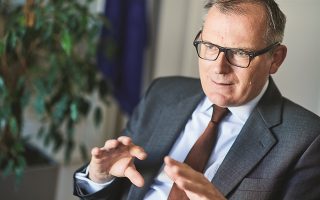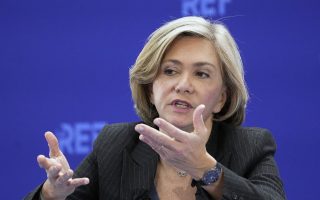Focus on LNG, not pipelines, US official tells Kathimerini
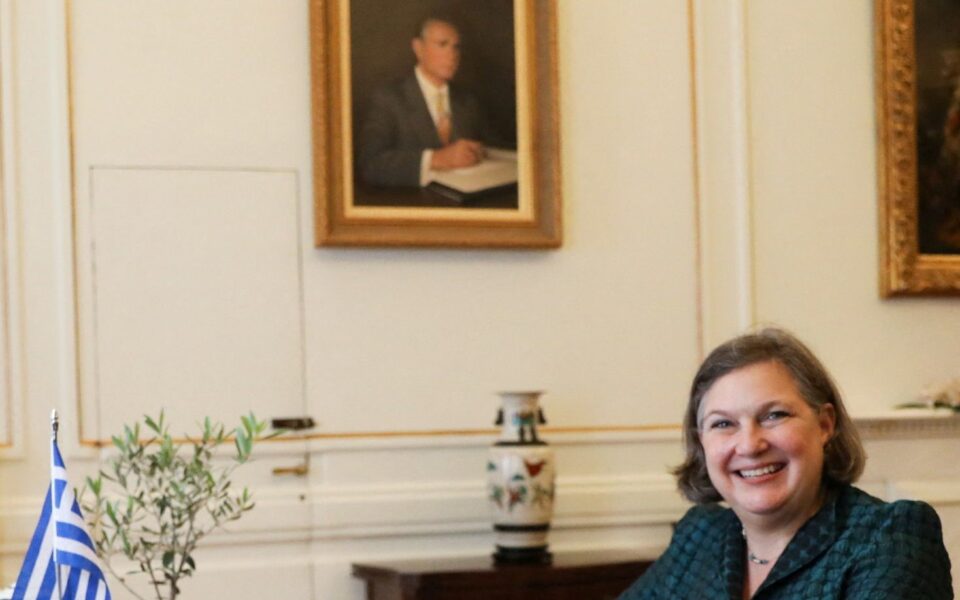
Any questions that may have lingered about Washington’s intention to support the construction of the EastMed or other pipelines in the Eastern Mediterranean have been put to rest by US Under Secretary of State Victoria Nuland, who spoke to Kathimerini during a visit to Athens on Tuesday.
Nuland noted that the United States is in favor of transporting natural gas via LNG tankers, while she also included Turkey among the countries that will cooperate with Greece, Israel, Egypt and the Republic of Cyprus in this broader framework, saying that the region could become an important “energy engine” for Northern Europe.
The American official also explained the United States’ intention to improve its strategic partnership with Turkey, saying that during her recent talks in Ankara, which she visited on Monday, she understood that the government of President Recep Tayyip Erdogan is aware that European and American sanctions against Russia will “have an impact there as well.”
Moreover, Nuland mentioned the importance of the northern Greek port of Alexandroupoli and the military bases used by US forces in the country, both for regional security, but also for transporting military forces to Eastern Europe.
You had a lot of meetings during your Athens visit. What was your message. How can Athens further enhance its capabilities in military or other dimensions?
The main reason to come to Athens was to say thank you for all that we are doing together. I have to say that the last time I was in government I made many trips to Athens and at that time it was all about helping Greece to get the international help it needed to recover. Very difficult times. To come now and see this security relationship at an all-time high and all of the work that has been done to build that which is now paying such dividends, as collectively we have to try to end this brutal war in Ukraine. And the role that Greece is playing in Southeast Europe as a security provider helping Ukraine has just been outstanding. And then secondarily, you know the fact that we have done a lot of work over the years to build energy diversification and the Trans Adriatic Pipeline and the Interconnector to Bulgaria and now the Floating LNG Terminal in Alexandroupoli. That allows Greece to be an energy hub not just for your own needs, but for all Southeastern Europe at the key moment when everybody is understanding throughout the EU and even in Turkey that betting on Russian oil and gas is a bad idea. So Greece is not only today providing options for everyone, but you are really sitting on the opportunity to really be part of the solution for the future.
Did you discuss specific energy projects?
We did. I had a chance to drop in for a brief moment to the trilateral meeting that Foreign Minister Nikos Dendias had with FMs Yair Lapid and Ioannis Kasoulides. As you know we support the three, but also the “3+1” with the US and a lot of that conversation was about energy options. So more LNG, more electricity cables between the countries. I think that the piece that we are moving away from now is this heavy pipeline at the bottom of the sea that’ll be very expensive and take 10 years to build. Everybody needs energy now, needs gas, needs electricity. So that’s why we are changing focus now towards LNG, towards these electricity cables etc, and I understand that the three had a good conversation about those things. We are eager to be supportive. I would say even in the context of the visit we had to Ankara on Monday they are understanding that they are too heavily dependent now on Russian oil and gas. So we see real opportunities for energy to be a healer and a binder in this part of the world.
Do you mean that the 3+1 but also Turkey could be a part of a broader discussion on getting East Mediterranean natural gas to European markets? And is the baseline scenario for LNG and not pipelines? It would be difficult to build EastMed but it would also be very difficult to build a pipeline from Israel to Turkey.
We don’t need to wait for 10 years and spend billions of dollars on this stuff. We need to move the gas now. And we need to use gas today as a transition to a greener future. Ten years from now we don’t want a pipeline. Ten years from now we want to be green. But right now we need the gas. So we’ve got to use LNG and we’ve got to use electricity connections that we can do more quickly. And Greece is a leader in all of that. And that’s important.
There is a public discussion in Greece about Ankara playing both sides: not being a part of sanctions against Russia, being a kind of a facilitator between Ukraine and Russia. Do you believe that the position of Ankara right now is a fair position? And do you believe that at the end of the day Turkey should be a part of the sanctions?
I think the fact that President Erdogan had an effective relationship with President Putin and an effective relationship with President Zelenskyy has been important in Turkey being able to create a safe space for diplomacy. And if this war is going to end we need a diplomatic solution at the end of the day. So it is good that they are able to meet in Antalya and keep talking. It would be better obviously if Putin would do what needs to happen, which is to have a ceasefire, because obviously peace will grow from that. It’s also really important that Greece has been providing security support to Ukraine, very generously, very quickly, very effectively – but so has Turkey. Turkey is also a security provider, and has provided some very high-tech and important weapons that have been effective. Your weapons have been effective for Ukraine on the battlefield and helped make a difference, but so have Turkey’s. Because frankly this war not will not end until Putin understands that it has been a strategic failure for him and that he cannot beat Ukraine with his military. I think that geostrategically for all NATO allies, for Greece, for Turkey, for the US, our overwhelming priority now is to end this war. So both of those things are important. Turkey has particular vulnerabilities that come out of its involvement in Syria, that come out of its higher dependence on Russian energy. But my feeling from my time on Monday [in Turkey], was that they understand that the effect of the EU sanctions and US sanctions have an impact there as well. There is a downhill effect and they cannot allow themselves to become a place where Russia can evade sanctions. And we had a good conversation about that. But what’s most important is we end this war. Also that we take the opportunity of being in the same place strategically to see if we can build on that to smooth relations as well.
Can energy discussions ease the situation and possibly lead to new discussions about the Cyprus issue? You visited Ankara, Athens and Nicosia.
I am interested in what folks in Nicosia have to say about those issues. Personally I see an opportunity. We always talk about trying to get a peace deal to ensure a bicommunal federation and then exploiting the energy. We’ll have to see whether that is the right order but under any circumstance the whole neighborhood needs energy and this part of the world can also be an energy engine for Northern Europe. And you see how quickly we have to make that transition away from Russia. Because they’re an unreliable supplier and they’re also an immoral partner as we see.
On the subject of the Mutual Defense Cooperation Agreement (MDCA), a lot of steps have been taken in the last few years. Do you see more? There are all of these locations – we have Alexandropouli, Souda, Andravida etc. There are also discussions on furthering cooperation on equipment. Did you talk about it in Athens?
Absolutely. The fact that we have a completely different, richer, deeper defense relationship with Greece than we had just a few years ago has changed not only what we are able to do together, but Greece’s ability to become a security provider throughout Southeastern Europe. Without that relationship we wouldn’t have been able to get more security support to Ukraine, literally within two days of Zelenskyy’s request. We wouldn’t have been able to get some of the equipment that the US had here up into Ukraine. We wouldn’t have had the intelligence picture that we needed to understand what Putin was going to do and prepare for it. But it’s not only that. It’s about the Harry S Truman [aircraft carrier] being able to come all the way up to the mouth of the Black Sea. The fact that Alexandroupoli and Volos and all of these locations give us opportunities to provide security not only for the US and for Greece, but for all the NATO allies in this region. And we talked yesterday about the fact that now Greece has made that transition to being a security exporter in the context of Ukraine, there are other opportunities to do things together. You’re going to be stimulating shipbuilding enterprises again here. Can we do more to provide coastal security in Africa and other parts of the world? So I think there are enormous opportunities here…
Why did the Europeans have such a hard time believing what the US had foreseen months before, with the Russian invasion of Ukraine?
Let’s start by appreciating that even the Ukrainians until just a few days before the war couldn’t quite grasp it. Perhaps didn’t want to believe that a neighbor was capable of this unprovoked, evil invasion. We all want to believe that the diplomacy we tried, that we were offering to Putin, would be accepted, would succeed, that we would start real talks. And because Putin was lying to all of us directly. Even lying to his own people, his soldiers. These poor 18-20-year-old Russian kids who were in Belarus getting ready thinking that they were doing an exercise and find themselves in Kharkiv, greeted not as liberators, but as enemies. I will also say that in this case the US intelligence was superb and it was detailed. And we’re not always able to share as much detail as we were this time. But folks were skeptical of that. We were not happy to be right about this. But I do think that the intelligence relationship that we have as NATO allies, that we all have with Ukraine now, we’ve learned something. That it’s valuable and we need to build on it and strengthen it, because this unfortunately may not be the last evil thing that we see from the autocrats as they come to try to change the rules of the road that the democracies have built and that strengthen us.
